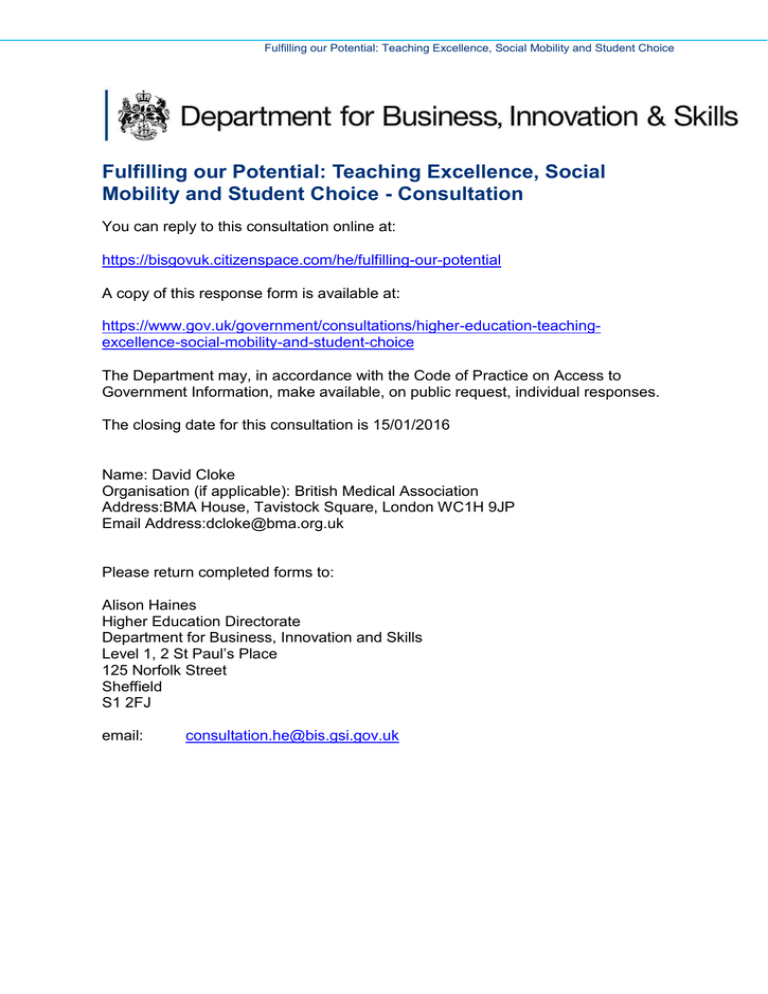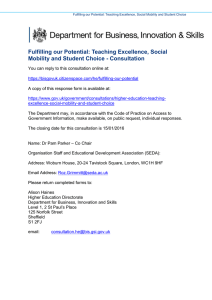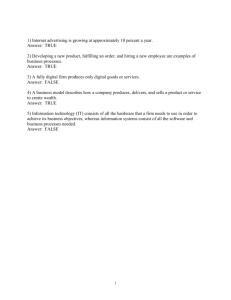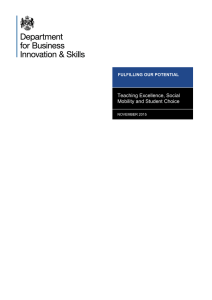Fulfilling our Potential: Teaching Excellence, Social Mobility
advertisement

Fulfilling our Potential: Teaching Excellence, Social Mobility and Student Choice Fulfilling our Potential: Teaching Excellence, Social Mobility and Student Choice - Consultation You can reply to this consultation online at: https://bisgovuk.citizenspace.com/he/fulfilling-our-potential A copy of this response form is available at: https://www.gov.uk/government/consultations/higher-education-teachingexcellence-social-mobility-and-student-choice The Department may, in accordance with the Code of Practice on Access to Government Information, make available, on public request, individual responses. The closing date for this consultation is 15/01/2016 Name: David Cloke Organisation (if applicable): British Medical Association Address:BMA House, Tavistock Square, London WC1H 9JP Email Address:dcloke@bma.org.uk Please return completed forms to: Alison Haines Higher Education Directorate Department for Business, Innovation and Skills Level 1, 2 St Paul’s Place 125 Norfolk Street Sheffield S1 2FJ email: consultation.he@bis.gsi.gov.uk Fulfilling our Potential: Teaching Excellence, Social Mobility and Student Choice Please tick the box that best describes you as a respondent to this consultation. Alternative higher education provider (with designated courses) Alternative higher education provider (no designated courses) Awarding organisation Business/Employer Central government Charity or social enterprise Further Education College Higher Education Institution Individual (Please describe any particular relevant interest; parent, student, teaching staff etc.) Legal representative Local Government Professional Body Representative Body Research Council X Trade union or staff association Other (please describe) Public sector equality duty Question 1: a) What are your views on the potential equality impacts of the proposals and other plans in this consultation? In our response to the Coalition Government’s Higher Education White Paper we highlighted medicine’s poor record in recruiting students from disadvantaged socio-economic backgrounds and urged the Government to ensure that its policies supported the widening of access to medicine in particular. We also stressed the importance of graduate entry to medicine as a means of widening access. Fulfilling our Potential: Teaching Excellence, Social Mobility and Student Choice We were concerned that the new system of funding teaching in higher education through a significantly increased graduate contribution would have consequences for medicine with some of the best students (especially those from lower income backgrounds) being deterred from entering medicine because of the amount of debt that it would entail. With fee levels of £9000 a year, medical students would see their debts increase to around £70,000. Research suggested that this would further deter the participation of students from the lowest socio-economic groups, who are more debt averse. It is notable, therefore, that the proposals in the Green Paper specifically include consideration of income and economic status specifically in part due to the known linkage with the protected characteristics (page 15 para 39). We support this. We specifically note that current standard data sets in such areas are problematic particularly relating to courses such as (but not limited to) graduate entry medical courses (GEM courses). Currently data are not reliably collected for GEM courses regarding an individual entrant’s initial economic status (prefirst degree) as it would be for a school leaver entrant (parental income and economic status). The lifetime impact of courses such as GEM on an individual (school to career) is not, therefore, currently quantified and thus the impact of these recommendations (positive or negative) will not be apparent. In our response to the 2011 White Paper we called for the impact of the increase in tuition fees on workforce planning and medical students’ aspirations to be carefully monitored and suggested that the particular position of women, who are more likely to take career breaks or train and work part-time, be considered separately. We also note the lack of evidence regarding the impact of maternity and pregnancy on student achievement. We would welcome further work in this area, especially with regard to postgraduate education and training. We repeat our call for a comprehensive equality impact assessment on the issues arising from the changes to Higher Education funding and for this to cover the impact on medicine (and indeed the other professions) separately. Overall, we welcome the greater emphasis on equality and diversity (including the recent proposals regarding Sharia-compliant student financial support) and the benefit that this would bring to patients and society as a whole. However, we also stress the underlying importance in medicine (and other courses) of suitability to practice and patient safety. b) Are there any equality impacts that we have not considered? ☐ Yes ☐ No ☒ Not sure Please provide any further relevant evidence. In our response to the 2011 White Paper we expressed concern that the increased cost to graduates of their first degree would mean that fewer would choose to participate in postgraduate study. This is of particular concern in medicine, where the degree course is already much longer and more costly than other degrees and where future work in medical education and research requires a significant number of medical graduates to undertake postgraduate courses. We appreciate that Fulfilling our Potential: Teaching Excellence, Social Mobility and Student Choice further work has been undertaken in this area since 2011 but we reiterate our call for the inclusion of participation rates in postgraduate study (including by the protected characteristics listed in paragraph 39) as part of the analysis of the impact of changes to undergraduate funding and for medicine to be analysed separately because of its higher costs and the need to encourage postgraduate study. Teaching Excellence Framework (TEF) (Part A: Chapters 1-3) Question 2: How can information from the TEF be used to better inform student and employer decision making? Please quantify these benefits as far as you can. In general we support the aim of improving access to high quality information about different courses and institutions including in particular about the financial support available to students, the hours of study undertaken by students in different courses and in different institutions and the quality of teaching. The best information requires a balance of measures with significant effort made to quantify the quality of provision and outcomes in addition to satisfaction. For example, there is increasingly helpful longitudinal data on the career progress and self-perceived preparedness for practice of medical graduates. We query, however, the direct link made between teaching and ‘productivity’ in the Green Paper and also suggest that there is a role for the professions as well as employers in shaping the kind of higher education system that we want. The linkage between outcomes on satisfaction based measures (NSS) and career progression and preparedness for practice is weak. This underlines the need to ensure that genuine measures of success in learning, attainment and personal development are prominent in the TEF and satisfaction at course exit is not overly dominant. In addition, there are intrinsic links between teaching at undergraduate level with teaching at the postgraduate and continuing professional development levels (the can be undertaken by the same person for example), and these links would need to be reflected in the TEF model for medicine. This is likely to mean that the model for TEF may needs to be specific to each discipline. Question 3: Do you agree that the ambition for TEF should be that it is open to all HE providers, all disciplines, all modes of delivery and all levels? ☐ Yes ☐ No ☒ Not sure Please give reasons for your answers. This depends on the model of TEF and how the data are presented. Whilst it is superficially attractive to have a single model with a unified output this may mask Fulfilling our Potential: Teaching Excellence, Social Mobility and Student Choice substantive differences in educational and subsequent personal attainment between disciplines and types of courses. If this were linked to a ‘satisfaction’ heavy TEF model, this could result in potential students and employers being misinformed about the quality and outputs of certain disciplines and types of courses as a whole. We are also concerned at the emphasis on ‘teaching’ rather than on a broader perspective including the empowerment of the learner, the extent of their self-sufficiency and critical faculties and the development of their skills in knowledge acquisition. For medical students and doctors (and others) there also needs to be consideration of the acquisition of their own teaching skills as well as their understanding and appreciation of research and research skills. The right mix of online teaching, formal teaching, clinical exposure and experience is very important for this group, and how teaching excellence in the more clinical aspects is delivered will need to be considered and appropriate systems developed. In some courses consideration should also be given to analysing the extent of graduate opportunities, readiness for and awareness of those opportunities and the building and awareness of transferable skills. Question 4: Where relevant, should an approved Access Agreement be a prerequisite for a TEF award? What other mechanism might be used for different types of providers? Yes, though data on the effect of Access Agreements should be assessed by course and discipline not just by institution for the reasons noted in answer to question 1. As noted, however, data on background needs to be reliable with a data specification that allows for diversity of courses. An example is the issue regarding data on students entering GEM courses. This lack of reliability will make it challenging for such courses to be compared to school leaver entrant courses. Question 5: Do you agree with the proposals on: a) what would constitute a ‘successful’ QA review ☐ Yes ☐ No ☒ Not sure To avoid duplication of effort and unnecessary bureaucracy, we highlight the need for the quality assurance process to take into account or even rely on the GMC’s quality assurance activities in medicine. b) the incentives that should be open to alternative providers for the first year of the TEF ☐ Yes ☐ No ☒ Not sure Fulfilling our Potential: Teaching Excellence, Social Mobility and Student Choice We believe that Alternative Providers should be able to demonstrate that they will meet the expected standards before they enter the sector or offer new courses and that the relevant regulators need to be confident that this will be the case before the courses are made available to students. c) the proposal to move to differentiated levels of TEF from year two? ☐ Yes ☐ No ☒ Not sure Please give reasons for your answer. This would very much depend on the bases for the decisions and how bureaucratic the process proves to be. Page 23 para 24 rightly states that there is no single measure of excellence and suggests the development of common metrics. As noted above, meaningful data may need to be type of course and/or discipline specific. If such data are excluded in an effort to ensure ‘a set of common metrics’ then the measure will be less meaningful and more subject to manipulation by providers by means of focusing initiatives on aspects of the metrics (such as teaching hours). If such data are included (and we believe that it should) then it may be artificial and misleading to then try and convert these to a common metric. Metrics and student prospectuses where they use statistics demonstrating that their graduates are in “employment” should indicate whether this employment is genuine graduate employment. This would be a robust metric to take into consideration. Question 6: Do you agree with the proposed approach to TEF assessments on Timing? ☒ Yes ☐ No ☐ Not sure Assessment panels? ☐ Yes ☒ No ☐ Not sure ☐ No ☒ Not sure and process? ☐ Yes Please give reasons for your answer. There are some key unresolved issues that make this challenging to address. A key theme of this response is the need to consider discipline specific data and metrics. Page 28 para 9 states that “In time, it is envisaged that panels will be convened for each discipline (subject) and include experts in that discipline to make Fulfilling our Potential: Teaching Excellence, Social Mobility and Student Choice relevant and robust judgements.” We believe that such panels will not be fit for purpose unless they are discipline specific. The risk of any process like TEF is that it measures the things that are measurable and effectively ignores those things that are not and thus, ultimately, has a distorting effect on the nature of activity being measured. Hence, the introduction of metrics might lead to courses being designed in such a way as to meet the measurable metrics rather than modelled solely on the basis of producing the best learning outputs for the student. In that light, we stress the importance of including ‘soft’ skills (including inter-personal skills) and social values that ideally would be introduced into all areas of higher education, particularly in disciplines from which graduates will be dealing with the public. At a time when IT is expanding what teaching means, such as through the growth in on-line courses, there is a risk that personal student contact is undervalued. TEF needs both to reflect the changes in the way teaching is delivered but also ensure that personal student contact is given the weight that it deserves. Question 7: How can we minimise any administrative burdens on institutions? Please provide any evidence relating to the potential administrative costs and benefits to institutions of the proposals set out in this document. It is vital that existing data are used where possible and that disciplines that are subject to professional regulation are able to submit this information as part of the primary data set not least to avoid costly duplication of effort. An example would be the UK General Medical Council (GMC) Medical Schools Annual Review (MSAR). This could be adapted to provide (in whole or in part) a data source that could then inform TEF. Question 8: Do you agree with the proposed approach to differentiation and award as TEF develops over time? ☐ Yes ☐ No ☒ Not sure Please give reasons for your answer. Differentiation is only meaningful on the basis of high quality data and in the absence of modelling it is challenging to assess whether such differentiation will be both meaningful and also be perceived to be meaningful. Question 9: Do you agree with the proposed approach to incentives for the different types of provider? ☐ Yes ☐ No ☒ Not sure Please give reasons for your answer. Financial drivers are powerful and will provide a clear focus for institutional action. The effect of this will be entirely dependent on the nature of the metrics and the Fulfilling our Potential: Teaching Excellence, Social Mobility and Student Choice degree to which they can be ‘gamed’. There is ample evidence for such gaming within REF with potential profound effects on courses that may or may not be desirable. Question 10: Do you agree with the focus on teaching quality, learning environment, student outcomes and learning gain? ☒ Yes ☐ No ☐ Not sure Please give reasons for your answer. We have already noted the importance of outcomes (gain) but note that this may be challenging to measure and will be discipline specific. Additionally, data specification relating to added value is currently challenging for certain courses (such as Graduate Entry Medicine) and there needs to be clear agreement on what would be used as ‘origin’ data and how students who had entered a comparable course (MBChB) by very different routes (school leaver vs. graduate) would be compared. We also suggest making some reference in subjects like medicine to the specific impact of teaching on the population the students are ultimately expected to serve. Opening-up training opportunities for and involving a wider section of the community could have a very positive effect in ensuring that all parts of society are represented in the medical profession, reflecting more accurately the demographic profiles of the people doctors are likely to be treating when qualified. Question 11: Do you agree with the proposed approach to the evidence used to make TEF assessments - common metrics derived from the national databases supported by evidence from the provider? ☐ Yes ☐ No ☒ Not sure Please give reasons for your answer. The common metrics need to be subject specific, and to incorporate a wide variety of learning environments. There is also a risk in medicine that there will be overlap or duplication with General Medical Council collecting for its assessments very similar evidence about teaching. Social mobility and widening participation (Part A: Chapter 4) Question 12: a) Do you agree with the proposals to further improve access and success for students from disadvantaged backgrounds and black and minority ethnic (BME) backgrounds? ☒ Yes ☐ No ☐ Not sure Fulfilling our Potential: Teaching Excellence, Social Mobility and Student Choice Please give reasons for your answer. Because of their particularly poor record in widening access and the importance of having professions that reflect the communities they serve, medicine and dentistry should be monitored, assessed and held to account separately from other courses. b) Do you agree that the Office for Students should have the power to set targets where providers are failing to make progress? ☒ Yes ☐ No ☐ Not sure Please give reasons for your answer. We also suggest that the Office for Students should be able to set targets for discrete parts of institutions and not just for the institution as a whole. c) What other groups or measures should the Government consider? With recent benefit changes making life more difficult financially for many people with disabilities and the fact that society’s attitudes to disability are slow to change this group deserves further consideration for measures to widen access to and improve support in Higher Education. Particular consideration needs to be given regarding access to medicine building on work done by the GMC. These groups of people are more likely to live in poverty than non-disabled people and, therefore, access is harder. Changes to the discretionary Disabled Students’ Allowance (DSA), which covers the extra costs that disability can lead to whilst studying, and reliance on the policies of individual HE providers need to be monitored for their impact on widening access, particularly in high cost subjects such as medicine. More should be done to build on the best practice of some HE institutions to make improvements to the support for disabled students. Question 13: a) What potential benefits for decision and policy making in relation to improving access might arise from additional data being available? As we value evidence-based decision-making in the policy arena as much as in medicine and acknowledge the importance that useful and accurate data play in building that evidence, we hope that decision-making would improve as a consequence of additional data being made available. If the data being collected are not helpful in terms of improving or facilitating decision-making then we would question whether it would be helpful to collect such data. b) What additional administrative burdens might this place on organisations? If additional costs are expected to be associated with this, please quantify them. Fulfilling our Potential: Teaching Excellence, Social Mobility and Student Choice Unsure, though we would suggest that this be continually monitored. Opening up the sector to new providers (Part B: Chapter 1) Question 14: Do you agree with the proposed single route into the higher education sector? ☐ Yes ☒ No ☐ Not sure Please give reasons for your answer, including information quantifying how the potential cost of entry would change as a result of these proposals. Higher education is a vital part of a complex learning/progression/employment ecosystem. This is particularly true of some vocational courses. For example, much of the teaching in medicine is provided by and funded through the NHS and the NHS remains a near monopoly employer of graduates. In additional, there are substantive legislated hurdles to setting up new courses. The potential for the rapid arrival of new providers could potentially destabilise many elements and have a profound effect on quality unless carefully managed. Student numbers, therefore, need to be considered in the context of the competition for clinical placements in the NHS and the cost of delivering medical education in the Service. As there is a fixed supply of clinical placements and of supervisors in the NHS there is an effective ceiling on the number of medical student places. There would be concerns about the maintenance of quality if that ceiling was breached. A further effective cap on medical student numbers is the number of places on the Foundation Programme. To avoid students committing themselves to 5-6 years of study and the £70,000 of debt that goes with it and still face unemployment at the end of it, the number of places on the Foundation programme should rise in line with the number of places for medical students eligible to work in the UK. In addition, given the current national spread of medical schools and the link between where doctors are educated and trained and their eventual place of work, it would be inappropriate just to allow market forces to determine where graduates are educated. For example, if Newcastle medical school closed, there wouldn’t be a medical student in the whole of the north across from Whitehaven to North Yorkshire. They are needed across the country and so should be trained across the country with adequate funding and intervention for schools who score less well on TEF. Question 15: a) Do you agree with the proposed risk-based approach to eligibility for degree awarding powers (DAPs) and university title? ☒ Yes ☐ No ☐ Not sure Fulfilling our Potential: Teaching Excellence, Social Mobility and Student Choice Please give reasons for your answer. We reiterate our answer to question 5 that providers seeking eligibility for degree – awarding powers should be able to demonstrate that they will meet the expected standards before being given such powers and for the relevant regulators to be confident that this is will be the case before the courses are made available to students. We believe that it would not be appropriate for teaching-only bodies to award medical degrees, since the study of medicine necessarily involves a strong and active research component. A body, tendering for the right to award medical degrees (leading to MB BCh or BChir) should normally be required to demonstrate a strong research background in medical and life sciences. This should be comprehensive enough to cover the full curriculum of medical study as well as employing a sufficient number of appropriately-qualified medically-trained academics. b) What are your views on the options identified for validation of courses delivered by providers who do not hold DAPs? We are wary of the prospect of the Government itself giving degree-awarding powers and also of the suggestion that the proposed central validating bodies should agree to an approach that promotes competition, diversity and innovation. The approach should be a more arms-length one based on maintaining and enhancing quality. Question 16: Do you agree with the proposed immediate actions intended to speed up entry? ☐ Yes ☐ No ☒ Not sure Please give reasons for your answer. Our concern remains that providers should be able to demonstrate (including to relevant professional regulatory bodies) that they will meet the expected standards before courses are made available to students. Provider exit and student protection (Part B: Chapter 2) Question 17: Do you agree with the proposal to introduce a requirement for all providers to have contingency arrangements to support students in the event that their course cannot be completed? ☒ Yes ☐ No ☐ Not sure Please give reasons for your answer, including evidence on the costs and benefits associated with having a contingency plan in place? Please quantify these costs where possible. Fulfilling our Potential: Teaching Excellence, Social Mobility and Student Choice For providers of medical education, planning with the NHS would be needed as NHS Local Education Providers (LEPs) providing placements under NUT (National Uplift for Teaching – formally the Service Increment for Teaching (SIFT)) would also need substantial contingency arrangements for the protection of both educational and clinical services in the NHS. If the location of clinical placements changed as a result of the exit of a provider from the sector then arrangements would need to be made to ensure that NUT funds followed the student whilst at the same time ensuring that clinical services were not disrupted. We support the suggestion that assistance should be provided to ensure the availability of a discipline in a region for the reasons noted in our answer to question 14. Finally, we would welcome clarification on how the proposed policy builds on or differs from existing HEFCE policy on collaborations, alliances and merger (CAM) activity in the HE sector. Simplifying the higher education architecture (Part C) Question 18: a) Do you agree with the proposed changes to the higher education architecture? ☐ Yes ☐ No ☒ Not sure Please give reasons for your answer. Whilst we welcome a regulatory structure that has a greater focus on the student experience we believe that this should not be the only interest reflected in the regulator of higher education providers and believe that there are wider public and professional interests that need to be considered by the regulator. In that light we wonder whether the title Office for Students is appropriate and possibly risks an element of Orwellian doublethink. b) To what extent should the Office for Students (OfS) have the power to contract out its functions to separate bodies? ☐ Fully ☒ Partially ☐ Not at all c) If you agree, which functions should the OfS be able to contract out? We suggest that regulatory functions related to medical degree courses could reasonably be contracted out or delegated to the General Medical Council. Overall, however, we would be concerned at the possibility of expertise already within HEFCE being lost. d) What are your views on the proposed options for allocating Teaching Grant? Fulfilling our Potential: Teaching Excellence, Social Mobility and Student Choice Option 1: BIS Ministers set strategic priorities and BIS officials determine formula. ☐ Agree ☒ Disagree ☐ Not sure Option 2: BIS Minister sets strategic priorities and allocation responsibilities divested to OfS ☐ Agree ☐ Disagree ☒ Not sure Please give reasons for your answer, We support the maintenance of the arms-length principle regarding the allocation of the teaching grant and would not support a specific role for BIS and its ministers. This would risk making the whole funding system extremely volatile and at the mercy of the whim of ministers who may change their mind about what constitutes priorities on a yearly basis. This, in turn, could limit the longer term forecasting power of institutions. Question 19: Do you agree with the proposal for a single, transparent and light touch regulatory framework for every higher education provider? ☐ Yes ☐ No ☒ Not sure Please give reasons for your answer, including how the proposed framework would change the burden on providers. Please quantify the benefits and/or costs where possible. We suggest that there should be a single and transparent framework, but rather than ‘light touch’ we prefer ‘risk-based’ regulation, which is proportionate, accountable, and targeted – moving away from a one-size fits all approach to ensuring that regulatory effort is targeted at providers who may be failing. Question 20: What steps could be taken to increase the transparency of student unions and strengthen unions’ accountability to their student members? We note that many students unions undertake significant pastoral work on behalf of the students they represent. We would add, however, that there are other representative bodies of students that could be formally recognised as having a part to play, such as Medical Student Societies. In addition, to ensure that students unions are fully representative, consideration should be given to how to enable students on intensive courses to take part in their activities. Question 21: a) Do you agree with the proposed duties and powers of the Office for Students? ☒ Yes ☐ No ☐ Not sure Fulfilling our Potential: Teaching Excellence, Social Mobility and Student Choice Please give reasons for your answer. The powers proposed seem comprehensive and broadly correct. We would like to see the Office having a duty to enhance as well as respect academic freedom. We would also suggest that the Office should report to parliament more generally on the state of the Higher Education sector and not just on matters to do with widening access. The duty to provide data should be extended to parliament. However, the paper should specifically acknowledge the role of the General Medical Council (GMC) in quality assuring undergraduate medical education and of regulating doctors. We repeat our call for the quality assurance of medical education to be formally delegated to the GMC to avoid duplication of effort and the over-regulation of medicine. b) Do you agree with the proposed subscription funding model? ☐ Yes ☐ No ☒ Not sure Please give reasons for your answer. We query whether a funding model wholly based on the institutions subscribing to it risks undermining its capacity for independent action on behalf of students and other stakeholders. We would suggest that at least some central funding from Government, perhaps ring-fenced for particular purposes, should be considered. The cost of regulation should be a joint public and university burden due to the significant vested interest the public has in the success of HE institutions. Question 22: a) Do you agree with the proposed powers for OfS and the Secretary of State to manage risk? ☐ Yes ☐ No ☒ Not sure Please give reasons for your answer. We would welcome the opportunity to review more detailed proposals as to how this will operate. We believe that the data that the Secretary of State can require the Office for Students to provide should also be made publically available through parliament. b) What safeguards for providers should be considered to limit the use of such powers? N/A Question 23: Do you agree with the proposed deregulatory measures? ☐ Yes ☐ No ☒ Not sure Fulfilling our Potential: Teaching Excellence, Social Mobility and Student Choice Please give reasons for your answer, including how the proposals would change the burden on providers. Please quantify the benefits and/or costs where possible. We note the reference in paragraph 68 to the costs associated with the Freedom of Information Act. We believe that the openness and transparency of decisionmaking that comes with the Act leads to better and more cost-effective decisions. We also believe that the Act enables staff collectively and individually to hold employers to account for their actions and would, therefore, oppose universities being exempt from the provisions of the Act. We also note that the Coalition government in its White Paper was committed to fostering a culture of giving, and we recognised that there was a role for voluntary giving in higher education at the time, though only for additional non-core activity. In that context, however, we would wish to see a strengthening of the provisions in paragraph 9 of Chapter 3: Further deregulation, with regard to those who have donated funds or land. Reducing complexity and bureaucracy in research funding (Part D) Question 24: In light of the proposed changes to the institutional framework for higher education, and the forthcoming Nurse Review, what are your views on the future design of the institutional research landscape? The REF is perceived by many of our members as a very time consuming and expensive exercise. It drives a relatively short-term culture (what will produce results within 4 years), and tends to result in the cutting down of ‘small saplings’ in favour of ‘large trees’. Smaller specialities in medicine, such as paediatrics, tend, therefore, to struggle. There needs to be more emphasis on identifying and growing promising new teams and areas. We don’t think it will be easy to reduce the burden on institutions and individuals, but better data infrastructure would help. Question 25: a) What safeguards would you want to see in place in the event that dual funding was operated within a single organisation? We would like to see how the mechanism of dual support would be maintained under these new arrangements. The process should be peer-reviewed and taken at arms-length from the government. Whilst this applies to England only, information on the implications for the wider UK context would be welcome. b) Would you favour a degree of hypothecation to ensure that dual funding streams, along with their distinctive characteristics, could not be changed by that organisation? ☐ Yes ☐ No ☒ Not sure Fulfilling our Potential: Teaching Excellence, Social Mobility and Student Choice Please give reasons for your answer Question 26: What are the benefits of the REF to a) your institution and b) to the wider sector? How can we ensure they are preserved? N/A Question 27: How would you suggest the burden of REF exercises is reduced? We are aware there will be separate review of the REF process to which we look forward to contributing. Anything that can be done to reduce the burden of the REF on institutions and to make the exercise (if it continues) more encouraging of medical research would be welcome. Question 28: How could the data infrastructure underpinning research information management be improved? N/A Do you have any other comments that might aid the consultation process as a whole? Please use this space for any general comments that you may have, comments on the layout of this consultation would also be welcomed. We agree that degree classification (Chapter One, paragraphs 36-41) is well overdue for review as the current classifications are increasingly meaningless. More granular awards need to be considered including GPA in medicine. We suggest the involvement of patients, patient groups and carers in the further development of proposals regarding medical education. Thank you for your views on this consultation. Thank you for taking the time to let us have your views. We do not intend to acknowledge receipt of individual responses unless you tick the box below. Please acknowledge this reply ☒ Fulfilling our Potential: Teaching Excellence, Social Mobility and Student Choice At BIS we carry out our research on many different topics and consultations. As your views are valuable to us, would it be okay if we were to contact you again from time to time either for research or to send through consultation documents? ☒Yes BIS/15/623/RF ☐ No




